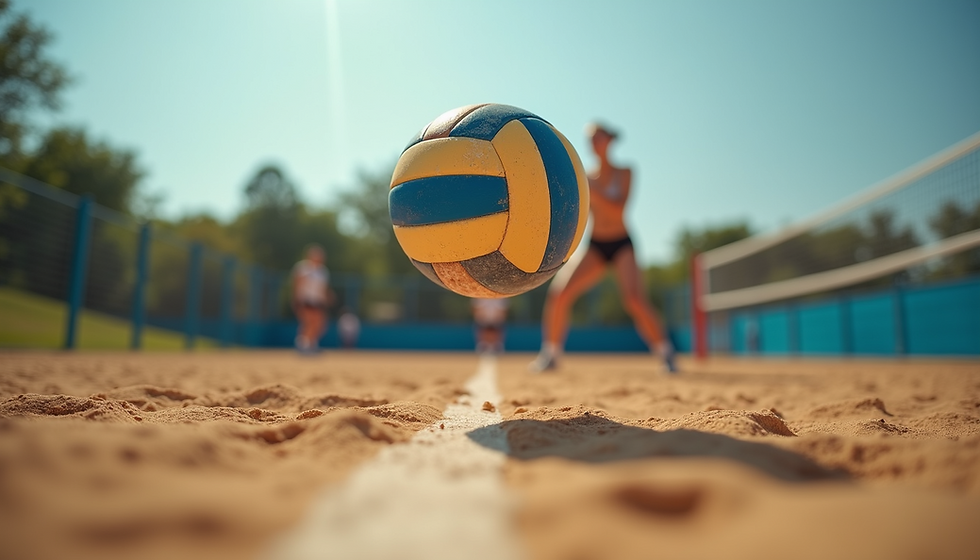Mindset: Practice Makes Permanent... Not Perfect
- Joy Gabrielli Gould
- Aug 16, 2025
- 4 min read
Updated: Aug 25, 2025

When I was a freshman in high school, our volleyball team was ranked last in the state. Quite honestly we might have even been ranked last in the country, because the state we played in was New Hampshire, a small, New England state where volleyball was not very popular at the time. My sophomore year of high school, my brother and his University of Michigan college roommate and best friend moved home to New Hampshire following their graduation. They had both played pick up and club volleyball during college, had a deep love for the sport, and volunteered to coach my high school team. It was a smart move, actually, because they literally had only one direction they could move the team - UP!
When they came in to coach us, one of the first things they had to deal with was the problematic skills we all had learned and practiced over and over again from well-meaning but under-prepared prior coaches. We had repeatedly practiced things like: setting so high the ball would hit the ceiling; hyperextending our hands while passing; and attacking the ball so hard it would hit the back wall of the gym instead of the floor. Obviously if you know anything about the game of volleyball, these would not be good habits to form. If you don't know the game very well - just take my word for it - they were bad habits that needed to be overcome. :)
I remember one of the earliest sentiments my brother repeatedly reminded us of was, "practice makes permanent... not perfect." This is an idea that has obviously stuck with me throughout my life, and I think the foundational principle is really important. If we regularly practice the wrong skills, we will inevitably become very talented at doing things incorrectly. While putting hours and hours of practice into something is critically important in the process of improvement, if the focus is just on the repetitions and hours with little focus on quality of skill development, one runs the risk of become very good at doing something badly.
As a parent of a volleyball player, knowing the game and how to coach your child's skills is helpful, but it's not essential. What is essential is guiding your child towards listening carefully to their coaches, focusing in on the specific feedback they are getting so they can apply it outside of practices, and being careful to avoid practicing (and essentially perfecting) bad habits. This will help your child develop a mindset that fosters growth and improvement.
You can start by encouraging your child to listen attentively to their coaches, who possess the training and experience to provide valuable insights into the game and individual skill development. It is crucial for young athletes to focus on the specific feedback they receive during practices and games. This feedback is tailored to help them refine their techniques, improve their performance, and develop a deeper understanding of the sport. Parents can play a significant role in reinforcing this focus by discussing the coach's advice with their child, helping them to internalize it and understand its importance. You can ask your child to serve as expert/coach to you by having them teach you what they are learning from coaches. This dialogue can also aid in clarifying any confusion the child may have regarding the instructions given by the coach, supporting their ability to apply the feedback effectively outside of practices.
It is also vital to emphasize the importance of avoiding the reinforcement of bad habits during practice sessions. The longer an athlete engages with a bad habit, the more difficult it will be to reverse it. Engaging in repetitive practice of incorrect techniques can lead to the entrenchment of these habits, which can also impair an athlete's ability to progress in their skills. The longer an athlete continues to practice a flawed technique, the more ingrained it becomes in their muscle memory, which can hinder their overall performance and development. As a parent, you can support your child by encouraging them to seek clarification when they are unsure about a technique and to be proactive in addressing any difficulties they encounter.
By fostering an environment where your child feels comfortable discussing their training and asking questions, you can help them cultivate a growth mindset. This mindset not only encourages resilience in the face of challenges but also promotes a willingness to learn and adapt. You can also extend their recognition of the principle of "practice makes permanent" into other areas of life - like school work, how they interact with authority figures and friends, how they establish habits around healthy living, etc.
Ultimately, while you may not need to be an expert in volleyball, your support in guiding your child to listen to their coaches, apply feedback effectively, and avoid practicing bad habits is invaluable in their journey as an athlete. Your involvement can significantly contribute to their enjoyment of the sport and their development as a skilled volleyball player.



Comments